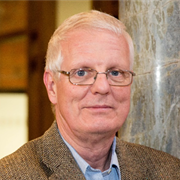 Having been at BU for three months, I thought I should introduce myself to the research community in the University and take this opportunity to tell you about some of my research interests so that anyone ploughing similar furrows can get in touch with a view to future collaboration.
Having been at BU for three months, I thought I should introduce myself to the research community in the University and take this opportunity to tell you about some of my research interests so that anyone ploughing similar furrows can get in touch with a view to future collaboration.
Dual trained in sociology and nursing (a fact reflected in my neologistic job title), my interests span social sciences and health. Coming from a School of Nursing and Midwifery, a lot of the work I am bringing with me to BU tends towards the clinical end of the spectrum, but I am really excited by the prospect of being able to re-engage a lot more deeply in the social scientific aspects of health and care.
In terms of substantive topics, my main focus is on palliative care (for example, I have been doing a lot of work around support for patients and loved ones dealing with cancer cachexia or wasting). I also do work on supportive care for cancer patients and survivors (a current example of the kind of thing I am involved in here is a qualitative study using Habermasian critical theory to examine patients’ experiences of care while taking oral chemotherapy, and how those experiences affect medication concordance).
In addition, I am interested in arts-based therapies (I recently led a randomised controlled trial of the effectiveness of music therapy for young people with behavioural and emotional problems). The subject population of this trial is indicative of the eclecticism of my interests, which include maternal and child care. Another example of this interest is the work I’m doing with colleagues in Brazil and the UK seeking social media solutions to Brazilian women’s health problems in the first year after giving birth.
Bringing together arts-based therapy and palliative care, I am currently involved in a feasibility study looking at whether music therapy is effective in reducing anxiety in hospice patients who are reaching the end of their lives (or more precisely, looking at whether a full RCT would be effective in evaluating whether music therapy is effective).
As a person trained initially in qualitative research who drifted into the dark realms of trialling, I am aware of the strengths and weaknesses of these differing approaches. I am also deeply interested in how they can be used in combination. I do a lot of methodological work grounded in critical realism, which aims to develop and encourage novel approaches to evaluation research that are capable of robust measurement of outcomes, comprehensive analysis of processes, and critical evaluation of human consequences.
I think that’s probably enough exposure of my chronically dilettantist approach to knowledge acquisition, so I’ll end by saying that if any of this interests you, it would be great to have a conversation.
Best wishes, Sam











 Nursing Research REF Impact in Nepal
Nursing Research REF Impact in Nepal Fourth INRC Symposium: From Clinical Applications to Neuro-Inspired Computation
Fourth INRC Symposium: From Clinical Applications to Neuro-Inspired Computation ESRC Festival of Social Science 2025 – Reflecting back and looking ahead to 2026
ESRC Festival of Social Science 2025 – Reflecting back and looking ahead to 2026 3C Event: Research Culture, Community & Cookies – Tuesday 13 January 10-11am
3C Event: Research Culture, Community & Cookies – Tuesday 13 January 10-11am Dr. Chloe Casey on Sky News
Dr. Chloe Casey on Sky News ECR Funding Open Call: Research Culture & Community Grant – Application Deadline Friday 12 December
ECR Funding Open Call: Research Culture & Community Grant – Application Deadline Friday 12 December MSCA Postdoctoral Fellowships 2025 Call
MSCA Postdoctoral Fellowships 2025 Call ERC Advanced Grant 2025 Webinar
ERC Advanced Grant 2025 Webinar Horizon Europe Work Programme 2025 Published
Horizon Europe Work Programme 2025 Published Update on UKRO services
Update on UKRO services European research project exploring use of ‘virtual twins’ to better manage metabolic associated fatty liver disease
European research project exploring use of ‘virtual twins’ to better manage metabolic associated fatty liver disease
Looks really interesting – I like the idea of the arts therapy especially.